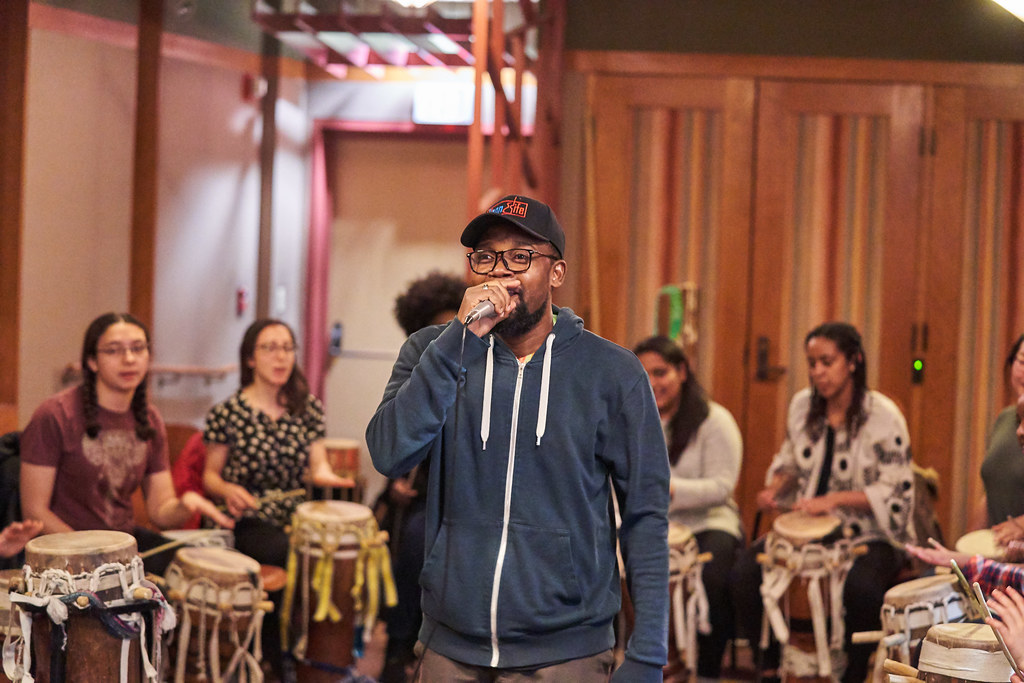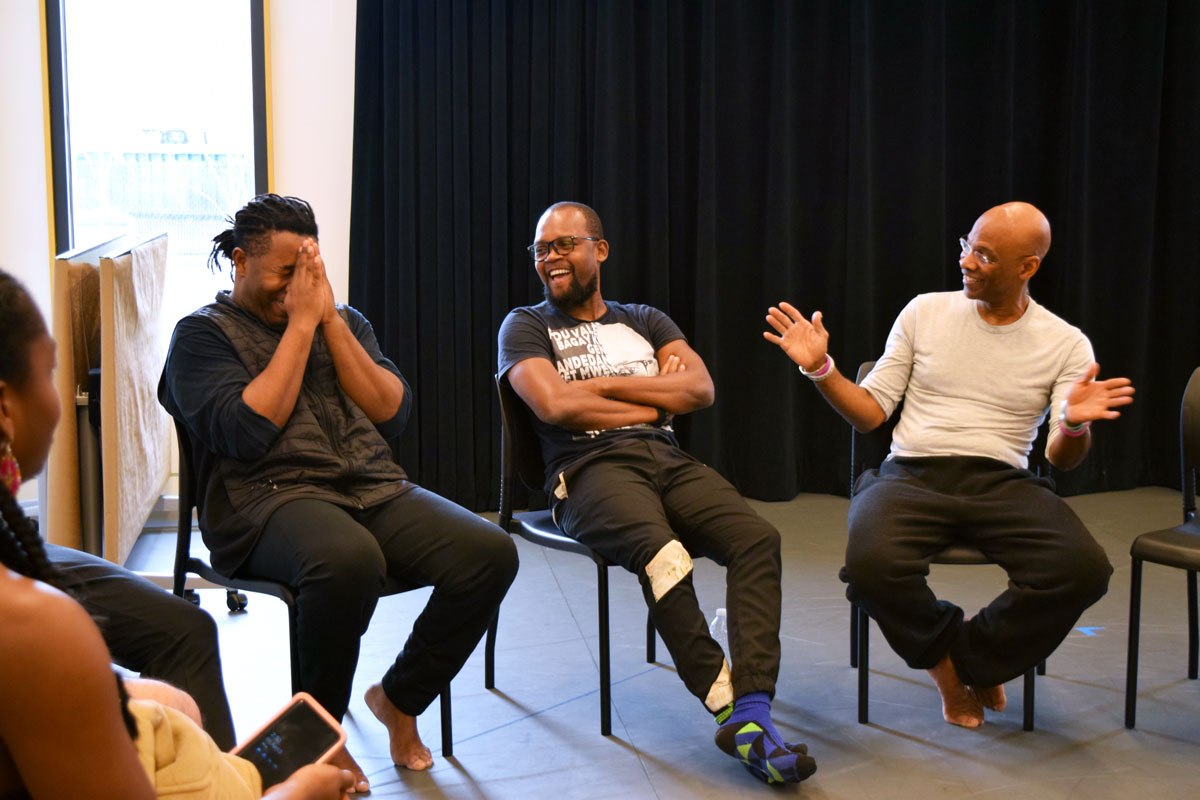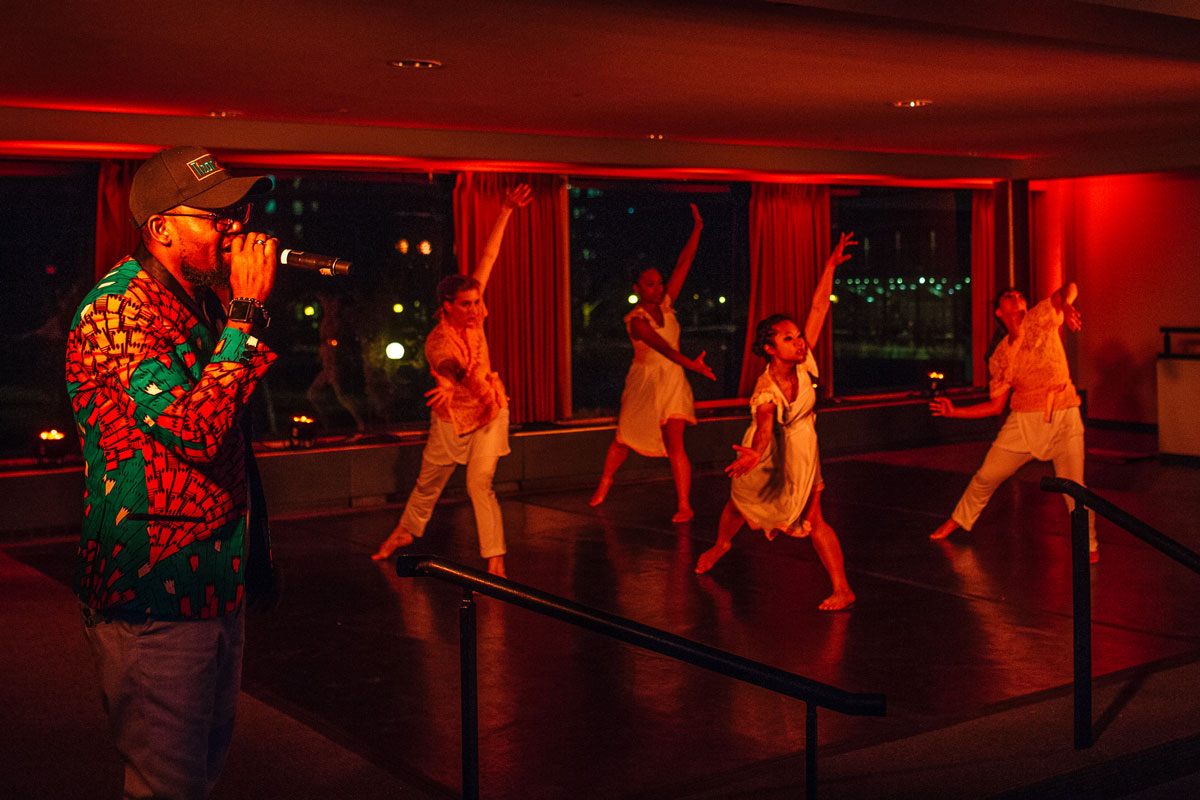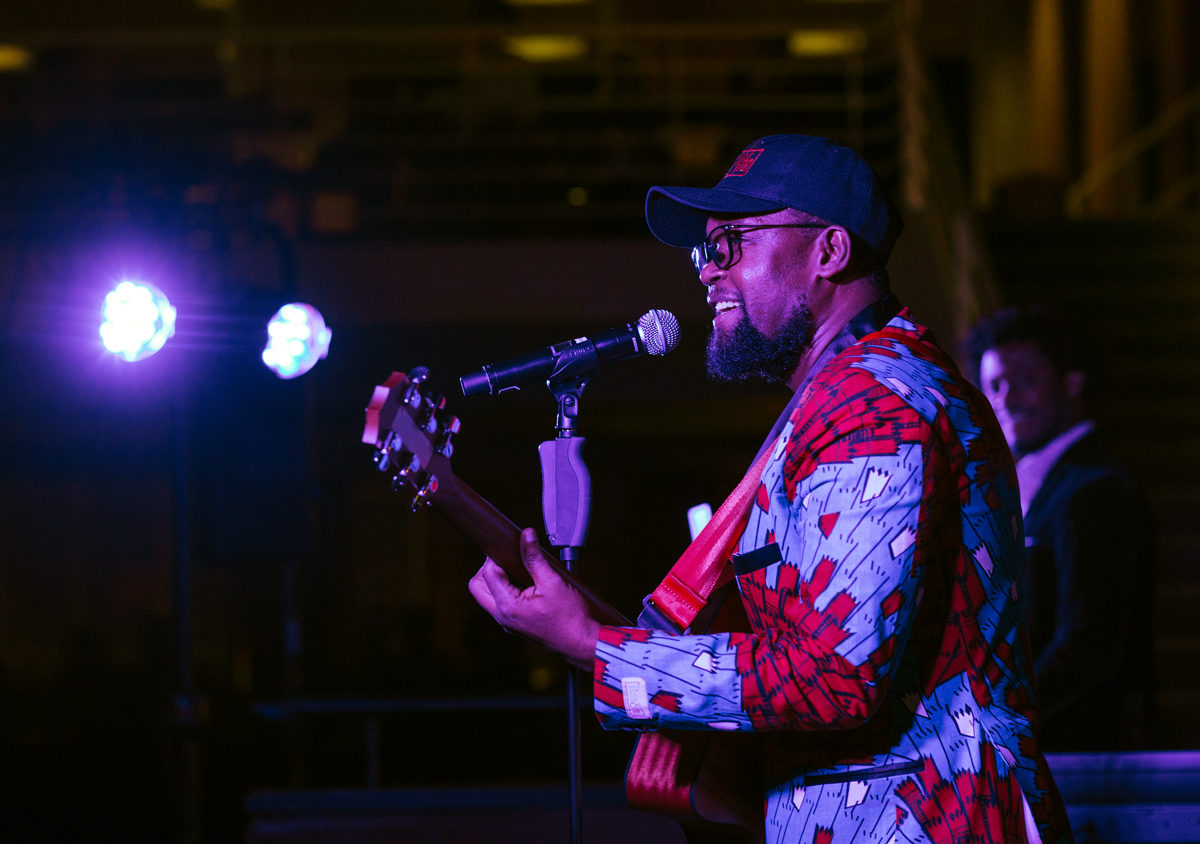The Haitian poet and rapper discusses the rich outcomes of a week-long residency at MIT.
Can art, poetry and music generate social change? That question was enthusiastically explored this April during a visiting artist residency with Haitian poet and rapper BIC. The week-long visit included workshops, classroom collaborations, and two concerts, both on and off-campus, as part of the 2018-19 MIT Sounding Series, presented by the MIT Center for Art, Science & Technology (CAST).
A recognized proponent of Haitian Creole (known as “Kreyòl” in Haiti), BIC (Roosevelt Sailant) collaborated with over 200 students, musicians, and dancers from MIT, as well as many local Haitians. A few highlights from the week’s activities included workshops and performances with Rambax MIT, a Senegalese drumming ensemble 21M.460, with local Haitian dance troupe Jean Appolon Expressions, as well as an evening of karaoke Kreyòl at Brothers’ Kafe Kreyòl, a local hub for Boston’s vibrant Haitian community.
Through his music, BIC demonstrated Kreyòl’s expressive range and its ability to unite a global community; the residency also spotlighted the importance of Kreyòl in Haiti’s educational system and national identity. In conjunction with Professor of Linguistics Michel DeGraff, director and founder of the MIT Haiti Initiative, the week proved both celebratory and purposeful.
BIC and DeGraff sat down to discuss his residency, and the role of art, language and culture in mobilizing social change. Their conversation has been excerpted and edited for length.

DeGraff: You first came to MIT in 2017 and worked with myself and Professor of Digital Media Nick Montfort to create digital literary art in Kreyòl. During that short visit you also gave a beautiful concert. The community came, students came, but it was just too fast. There was much more to share with the wider community. Boston has the third largest Haitian community in the U.S., after Miami and New York. It was important to have you return to MIT.
BIC: This was really a huge week for me, in terms of meeting people and knowing people better, especially at MIT. I had the possibility to share with people from other languages, people from different cultures. I realized that yes, the world is one. I felt I was home here. I was appreciated for who I am. They were open to learn from me, as I was learning from them.
DeGraff: We have students from the Caribbean, from Africa, from Asia. And the issues that they were coming up with in our discussions were the same as in Haiti, in terms of language inequities, in terms of social classes, and how language and culture can be used as proxies for division.
You so clearly use your own life in Haiti to address these issues that are the same everywhere. Language can be used both for domination, for oppression, but it can also be used for liberation.
It is a beautiful universal theme—that what we see and say in the Caribbean is also true in China and Nigeria.
BIC: For myself, as an artist, I play music. Music is a language. But a language that everyone understands. Music is the language that everyone speaks.
DeGraff: That was beautifully demonstrated in your musical improvisation with Rambax, MIT’s Senegalese drum ensemble. There was another amazing moment in Professor Patty Tang’s class, Popular Musics of the World 21M.294.
BIC: We were going along and then, they all turned the page in unison. And I was like, what’s going on!

DeGraff: You were pleased that they were able to read your songs in English. It was an amazing moment, especially when you think about the history of Haiti and Senegal—one point of departure for native Africans kidnapped into slavery.
BIC: I don’t want people to think that the only language I would like them to speak is Kreyòl. Absolutely not. That’s not my point. Speak whatever language you can. But if we want to educate our children, educate them in the language that they understand. When it comes to Haiti’s education system, this is Kreyòl. After that, they can speak five, seven or more languages.
It’s important for me to teach my people the importance of their native language—to recognize themselves by their language, but also to know that the world is open for them. When you understand yourself, when you accept yourself, when you love yourself, no matter what language you speak, you have the potential to express yourself to the world.
DeGraff: That’s beautiful. This is the very theme that we try to teach in Black Matters 24.912 and in Creole Language and Caribbean Identities 24.908. What you’re saying is that our language, our culture, is an asset—it is wealth.
BIC: That’s it.

DeGraff: We’ve been discussing the Kreyòl alphabet, which has been Haiti’s official alphabet since 1979, a spelling system that uses 32 letters. This system establishes the basic rules for mapping the sounds of Kreyòl into letters, and vice-versa. It’s a beautiful system.
As a linguist, I see it as a mathematically ideal system. It’s a bit like Spanish, with a one-to-one relationship between sounds and letters. So once you know how to write the sound, it’s always written the same way, very much like English.
BIC: I used to be an English teacher. At the time, you needed to come to school and speak French. The teacher speaks French. If you don’t speak French, it seems like you’re not really a good teacher.
DeGraff: Teachers in Haiti are often afraid to use Kreyòl in school, especially in fancy schools, because the parents would be upset. But the teachers know that they teach better in Kreyòl. And this is where you come in. Through your poetry and songs, you show that Kreyòl is both beautiful and powerful.
BIC: All week I’ve been meeting with MIT students and learned a lot about “Black Matters” and “Caribbean Identities”. I learnt that I’ve been “code switching” all my life without knowing it! I didn’t even know about code switching!
I think education is the number one priority for Haiti to get out of this cycle of impoverishment. I don’t see Haiti as poor—Haiti is impoverished. Because what’s the connection between being intelligent and speaking a language? The language you speak depends on the environment where you grow up.
DeGraff: Exactly. I couldn’t have created a better example to share with students who are trying to understand the challenge of making social change, and then sustain that change. You’ve shown us ways in which, through language, through art, through culture, we can begin to escape the cycles of impoverishment.
BIC: Thank you for saying that. I believe one can make social change, one can address these very difficult and often sad issues with laughter, with joy, with love, by dancing and singing, drumming with friends, and enjoying their company.
Social change can be fun. Without that, I think it is never going to happen. Because it has come from here, right? [gestures to his heart] It has to come from the soul.
Written by Connie Blaszczyk


